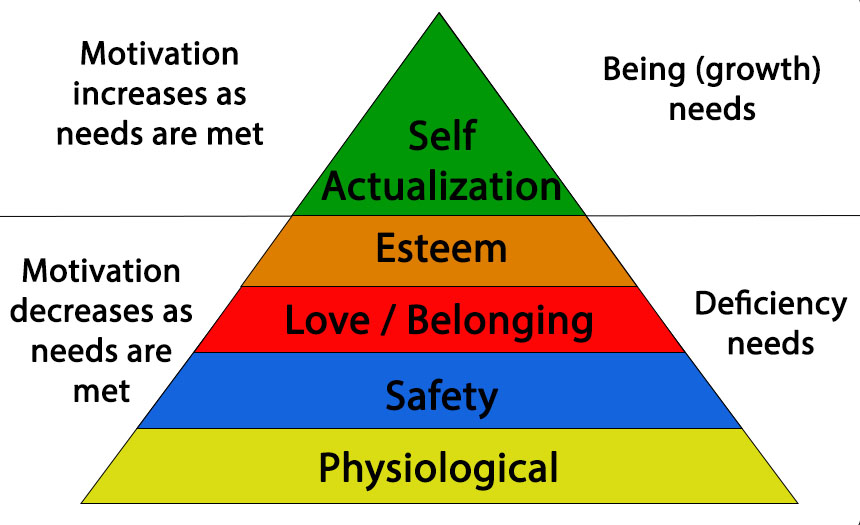How does motivation affect the workforce?
The theme for this month’s blog post is staffing, however I’m not talking about HR and recruitment, rather I’m looking at our motivations.
Once you have found the right people to sit on your bus with you, keeping them would be good, right? You may have heard of Maslow’s hierarchy of needs, a motivational theory based on individual needs. When applied to the work place these can help us to understand how fulfilled our employees feel, what drives them to be successful and ultimately what might lead them to move to another job.

We all have basic physiological needs that have to be met for us to live. These are biological requirements for us to survive such as food, water, warmth and rest. Once these are met we can start thinking about our safety needs, we want to feel safe and secure with a roof over our heads and job that brings financial security.
After our basic needs are met our attention turns to our psychological needs. Humans are social beings so it should come as no surprise that the next set of needs to be covered are love and belongingness. Relationships are key here, whether that’s with family, friends, work colleagues, they help validate who we are and help us to feel connected and part of the group. In the work place, our need to belong is also reflected in our desire to feel trusted and accepted.
Esteem needs can be broken down into two types, esteem for oneself – think here of dignity, achievement, mastery and independence, and second the desire for reputation or respect from others from which our feelings of prestige and status come.
Maslow’s hierarchy culminates with self-actualization needs, these come from the desire to reach or exceed our potential and the desire for personal growth and development. These will be different for each of us.
So, you’re probably wondering how this can be applied to the world of work and how might it help you when it comes to managing your employees. Motivation is the driving force for change for many of us, if we’re unhappy with our job for example then we’ll use this as the catalyst to find a new one. A new employee starting a new job, will look to have their feelings of belongingness and esteem met, as an employer your role is key here. You need to make sure that the onboarding process helps them fit in with the team quickly and effectively so they feel part of the team and they don’t decide to leave at the end of their probationary period. The same applies to employees who are promoted from within, you want them to settle in quickly so that they’re not motivated to leave.
The next phase, or self-actualization, is even more important, as it ensures that your staff will stay. Retaining your high quality staff will help your business to reach it’s goals but for this to happen each member of staff needs to feel fulfilled by what they’re doing. As an employer your role is to allow your team the opportunities to grow, for example, promotion possibilities, a work relevant external course and express themselves, these motivations are very personal.
So it could be that you have a sales person with a passion for creativity, how can you usefully channel this so that a) they feel fulfilled and are therefore motivated to stay and b) help the business to prosper. For other members of the sales team their motivation could be financial reward, so a bonus or incentive scheme might be their driving factor. As the business owner it’s also important that you consider your self-actualization needs. It might be that you want to leave the office early once a month to play golf. So you will need to recognise this need and plan to make it happen.
Found this blog post useful? Then I’d like to offer you a Free 121 Session. Interested? Give me a call on 07952 112432, or Click here to send me an email.







This article opened my eyes, I can feel your mood, your thoughts, it seems very wonderful. I hope to see more articles like this. thanks for sharing.
I may need your help. I’ve been doing research on gate io recently, and I’ve tried a lot of different things. Later, I read your article, and I think your way of writing has given me some innovative ideas, thank you very much.